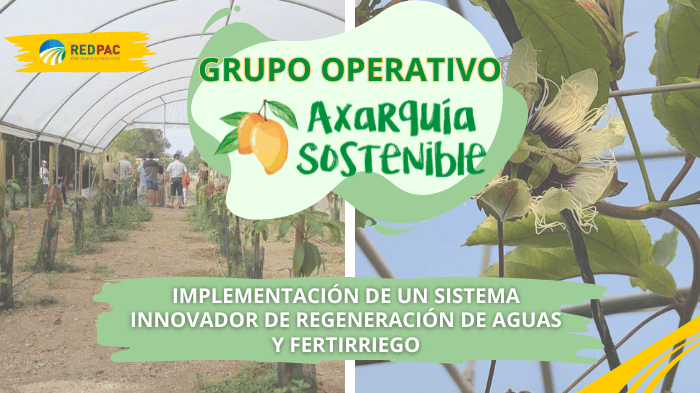
19 de June de 2024
Innovación
The use of reclaimed water allows subtropical crops, such as avocados and mangoes—where the GO has focused its efforts—to be treated with nutrients that are more easily assimilated by plants, which means greater use of a wasted resource.
It's true that matter is neither created nor destroyed, but natural resources can be wasted, and in many cases, beyond regeneration. One of the most important resources (if not the most important) for the agri-food sector is water , a substance that is becoming increasingly scarce and that humans, on the other hand, need more and more of.
The agricultural use of this resource, essential for the production of products, is attempting to adapt its methods to use less water and maximize efficiency. In La Axarquía , one of the nine regions of Málaga , rainfall has decreased dramatically in recent years, and its traditional agricultural landscape is seriously at risk due to its dependence on rain, which has left the La Viñuela reservoir—the largest in the area—at 9.7% of its capacity.
The Axarquía Sostenible Operational Group was established in March 2023 to address these challenges and utilize reclaimed water for certain types of crops. This is wastewater that has undergone a series of tertiary treatments to adapt its quality to use, in this case, in non-conventional water agriculture (not well or reservoir water).
Project approach and objectives
BIOAZUL , the coordinating company of the Operational Group (OG), emphasized in statements to the PAC Network that "the need to act on water scarcity is becoming increasingly recognized" in Andalusia, according to project manager Gerardo González Martín.
The Axarquía GO focuses on subtropical crops, primarily avocados and mangoes, which require significant water consumption. The use of reclaimed water allows them to be treated with nutrients that are more assimilable by plants, something that is even more necessary in coastal areas where wastewater treated in treatment plants is discharged into the sea. Therefore, the project represents a "net use of a resource that is being wasted."
The project sets a series of objectives:
- Develop and implement a precision irrigation system with reclaimed water , tailored to the specific needs of each crop.
- Create an automated tool for fertigation management , optimizing fertilizer dosage and preventing soil and groundwater contamination.
- Improving energy efficiency in the wastewater regeneration process.
- Expand the application of the innovative system to various fruit and vegetable crops , including mango, avocado, pitaya, and passion fruit.
- Validate the economic viability of the technology in large-scale plantations.
- To train farmers, irrigators, and administrations in the use of fertigation with reclaimed water.
- Promote the use of reclaimed water through outreach and awareness-raising activities .
González Martín highlights two fundamental benefits of the project:
- Farmers can count on an alternative resource to traditional water that also contains nutrients , so they can save resources from chemical fertilizers.
- Development of a digital fertigation tool that can calculate and control nutrient levels in the water to meet fertilization plans.
Current situation
By mid-June 2024, González Martín wants to be cautious: "It's too early to draw conclusions," he says, but acknowledges that there is "promising data on the percentage of chemical fertilizer savings for a farmer." Currently, they have already set up a greenhouse where they are conducting trials with pitaya and passion fruit , a rather innovative use of reclaimed water, expanding beyond mango and avocado.
"We've been irrigating with reclaimed water since the beginning of the year. Now we're going to begin developing the digital tool," he emphasized, adding that it will be easy to use and aimed at the end user: the TROPS cooperative provides agronomic advice to irrigators, and the idea is for them to acquire this tool to advise their members.
What about the initial investments and implementation? The water will come from the Algarrobo City Council's municipal wastewater treatment plant, from where it will be supplied to irrigators and the treatments indicated according to the project's final results. "In that scenario, the irrigators would have to cover the costs, but the municipality is the one investing, and the irrigators would provide the infrastructure" they needed to transport the water from the municipal wastewater treatment plant to their farms.
Dissemination of the project
In 2023, the GO began its activities by meeting with partners, presenting the testing site, and this year they will hold two training workshops with stakeholders from the region. In addition to regularly updating their website, social media , and newsletter, they will publish a summary of Best Practices and a video showcasing the testing site.
But the project isn't the brainchild of scientists out of touch with reality. The entire sector is "awaiting reclaimed water," says González Martín, who has noted the "interest" of professionals and end users in meetings with them, with government agencies, and the Algarrobo City Council.
Finally, although the GO has not yet focused on this, BIOAZUL believes the study is "highly replicable in other areas, especially those with water scarcity."
Partners and financing
The “GO Axarquía Sostenible: Implementation of an innovative water regeneration and fertigation system in the Axarquía region” is made up of BIOAZUL (as coordinator), CSIC-IHSM La Mayora , the Algarrobo Irrigation Community and the TROPS cooperative . Other collaborators are the Costa del Sol-Axarquía Municipal Association , the Spanish Tropical Association , Seragro Integral , Axaragua , theAlgarrobo City Council , the Axarquía Rural Development Center , and the Young Farmers' Association ( ASAJA ).
The project lasts 24 months, until February 28, 2025, and consists of a budget of 254,993.22 euros financed 100% by the European Agricultural Fund for Rural Development ( EAFRD ) of the European Commission .









